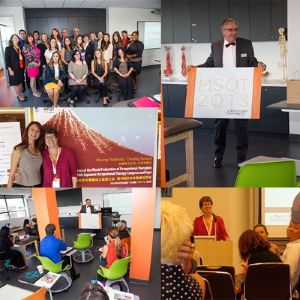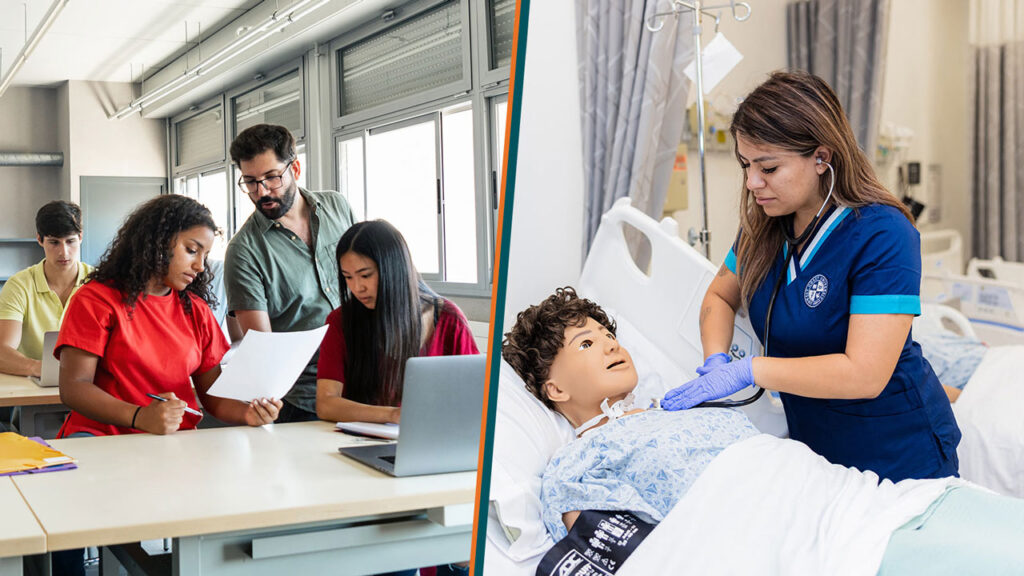The Master of Science in Occupational Therapy (MSOT) program was only launched one year ago, but the program is thriving at WCU Los Angeles, largely because of the stellar faculty who bring a wide variety of expertise to the program under the leadership of Dr. Nicolaas van den Heever, founding Dean and MSOT Program Director.
Dr. van den Heever says that the biggest challenge for a new program is to establish and build credibility in the OT academic community, and WCU faculty have been hard at work to make that happen. All six faculty members, and Dr. van den Heever himself, have been very active in state, national and even international occupational therapy organizations, representing WCU in a variety of ways.
“We have recruited the top notch faculty members without so much as placing a single advertisement, and that is because we are all very active in the OT professional world,” Dr. van den Heever said. “People came to us saying they’ve heard about the exciting things at WCU and we want to teach here.”
So how are people hearing about the OT program at WCU? Here’s a good example: over the summer, WCU shined on a global stage. Dean van den Heever, Assistant Professor Diane Gale, MBA, OTR/L, and Associate Professor Dr. Heather Thomas, OTR/L, Ph.D. traveled to Yokohama Japan in June for the World Federation of Occupational Therapy (WFOT) conference, where all three were selected to give presentations. There were more than 6,000 presentation ideas submitted to WFOT for the 5-day event, so Dr. van den Heever says it is an honor to have been selected.
Over 5,000 participants from 53 countries attended the WFOT conference, including an appearance by Emperor Akihito and his wife.
“There were people from all different countries around the world, which created a fascinating environment,” Gale said. “It was truly a privilege to represent WCU at the event.”
Gale gave a WFOT workshop based on a paper she wrote about an emerging practice in OT fieldwork, using WCU’s participation in “Clinic in the Park” at the Great Park in Orange County, a community setting at a farmer’s market where WCU attends to provide interventions in occupational therapy. It is a rather unique setting for OT fieldwork.
“WCU is setting the bar for emerging practice in OT. Not only do we talk about it in our program – we do it in our fieldwork,” she said. “We’re doing something here that the rest of the OT community is just getting started trying to get a handle on, especially in light of health care reform. It’s nice to be part of a program doing that.”
Heather Thomas’s presentation at WFOT conference shared her experiences with field work in Haiti following the devastating earthquake. She went to Haiti with 4 students in 2010, and what she found was a health care system that was completely overwhelmed.
“In that country there are no OT programs,” Thomas said. “It was unlike anything I’ve ever seen before.”
Working with a physical therapist, they developed a rehab technician training program to train Haitians to provide OT and physical therapy services. Her WFOT presentation was about the aftermath of a large disaster and how OT can help give victims their lives back, using her experience in Haiti as an example. Her presentation also demonstrated how to train lay people to provide rehab services if there are no formal programs in place.
“This is what it means to be active in your profession – not just working in OT. Our program at WCU is not about what occurs in the classroom, but what happens outside of it. Every single faculty member presents at various events. Writing, publishing, all of the academic work we do outside the classroom really sets us apart from other schools,” she said.
That philosophy was the basis for an academic paper that Dr. van den Heever authored based on a qualitative study that reviewed how the profession is introduced and portrayed to the public and prospective students. It includes a descriptive analysis of the concepts of the core domain of the Occupational Therapy profession available to its consumer and providers. His WFOT presentation focused on occupation-based practice and education, illustrating how this unique element will ensure the longevity of the profession.
His presentation challenges OT educators to consider: Does the profession practice what it preaches? Is the core domain of the profession clear? How do we achieve uniqueness?
“Occupation-based practice has a clear mandate as evidenced from historic documents, current media, the sociocultural milieu, and the actions taken by professional organizations,” he said. “By providing interventions that are not occupation-based, Occupational Therapy professionals are responsible for the vagueness that surrounds the profession.”
“Our faculty provide a quality education to our students, but we also go above and beyond as we are actively involved in the profession, contributing to research and the body of knowledge of the profession,” he added.
Ultimately, that is what sets the MSOT program apart, attracting higher caliber faculty and students.
Dr. Jeb Egbert, University Provost said “One of the professional accreditation agencies with whom we work recently told me ‘Great leadership, Great program.’ While that is no doubt true, it should also be stated that with great leadership and a great faculty, we can anticipate great outcomes. And that seems to be exactly what we have with our MSOT program.”
WCU provides career guidance and assistance but cannot guarantee employment. The views and opinions expressed are those of the individuals and do not necessarily reflect the beliefs or position of the school or of any instructor or student.



